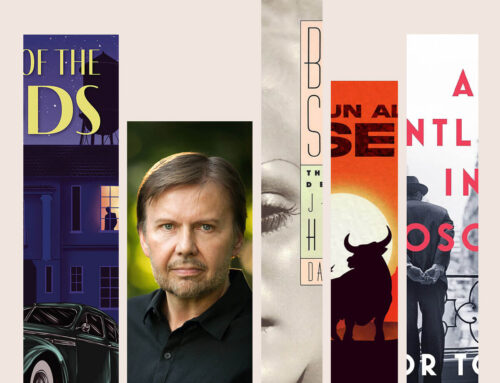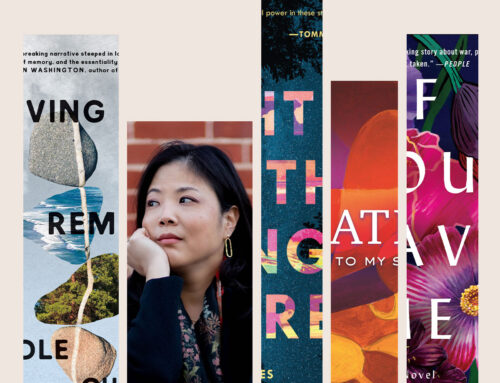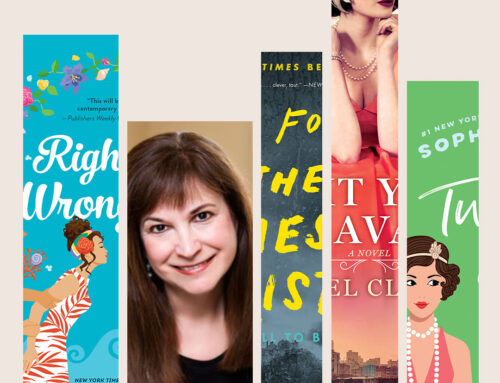Catherine Aponte, the author of A Marriage of Equals, is as much a reader as she is a writer. Learn more about the books that she loves – they all complement her new book quite perfectly if you ask us.

The New “I Do:” Reshaping Marriage for Skeptics, Realists and Rebels by Susan Pease Gadoua and Vicki Larson
Therapist Susan Pease Gadoua and journalist Vicki Larson tell us that we have more latitude today in defining a marriage that suits our own life plans than couples have in the past. They cover the numerous ways in which couples can say “I Do” – e.g., starter marriage, companionship marriage, parenting marriage, open marriage, and safety marriage among others – and the pros and cons of each. Gadoua and Larson do a nice job of tracing the history of marriage, showing that what we consider “traditional marriage” is a relatively recent form. This book will help you think more consciously and creatively about marriage – offering a new roadmap for marriages in the 21st century.

The Unmade Bed: The Messy Truth About Men and Women in the 21st Century by Stephen Marche
This book is a good read if you hope to have a marriage of equals. Marche, who, at the time was a new father and tenure-track professor, moved with his wife to Canada where she had been offered her dream job. He prioritized her job over his. The Unmade Bed is a personal exploration into their everyday life including mansplaining, sexual morality, parenthood and how to divide household tasks. Marche discovers through this process that women still struggle to get real power in the world and in their relationships while men struggle with their own masculinity. For Marche, the only way out of these struggles is together! Marche’s wife has an ongoing commentary throughout the book – innovative – I liked it.

The Unfinished Revolution: Coming of Age in a New Era of Gender, Work, and Family by Kathleen Gerson
This report of a study done by Gerson looking at how young people who grew up in an era of more fluid marriages, less stable work careers, and profound shifts in mothers’ ties to the workplace. Gerson asked these young people how they view their options for an equitable, satisfying and stable marriage. The news is not so great – hence the title of the book, “an unfinished revolution.” Gerson found a big gap between what young people’s ideals about family life were and what choices they felt they actually had. She found a big difference between how men and women viewed their fallback positions differently; women opted for autonomy and self-reliance over economic dependence on a relationship that might not last. Men, on the other hand, opted to return to a neotraditional arrangement in which paid work is their primary family contribution with their wives carrying a larger share of the household labor. The deeply discouraging results from this study support my continuing quest to help young people “finish the revolution” one marriage at a time.

Labor of Love: The Invention of Dating by Moira Weigel
I encountered Mora Weigel’s work through an article in The Guardian newspaper about the myth of the “biological clock” which is, in fact, a metaphor invented in the late 1970s by a man as a foil to the feminist movement of that era. And it has been used to reinforce sexist ideas ever since. In Labor of Love Weigel writes entertainingly about dating in the current era. As she says, ever since young men and women started to go out together, older generations have scolded them. The first women who made dates with strangers were often arrested for prostitution; long before “hookup culture” and “petting parties.” Weigel notes that dating is, and always has been, tied to work; instead of “meet you at six,” it is now a text to a partner “u still up?” Labor of Love is not a guide to “getting the guy,” it’s a feminist perspective on how looking for love shapes who we are – and hopefully leads us closer to the happy ending that dating promises.

Mating in Captivity: Unlocking Erotic Intelligence by Esther Perel
Perel is a couples and family therapist who writes insightfully and intelligently about sex in her 2007 book, wonderfully titled Mating in Captivity, which is about maintaining a vibrant sexual relationship for the long haul of marriage. Perel talks about having to maintain the simultaneous perspective of togetherness and commitment in our marriage while maintaining our individual autonomy. She reminds us that togetherness gives us the reassurance that we are loved and valued. Independence and autonomy, on the other hand, is about adventure and excitement. One way we express this adventure and excitement in our marriage is through sex. Thus, we have the tension between autonomy, which thrives on excitement and risk, and commitment, which thrives on the comfort and stability of togetherness. Perel explores in depth these issues from both a psychological and sociological perspective. Not always an easy read but worth the effort.

Testosterone Rex: Myths of Sex, Science, and Society by Cordelia Fine
This is a must-read book because it’s fun, and more importantly, it is a great antidote to lazy thinking about entrenched sexism. Fine, a psychologist, brings irreverence along with meticulous research to bust old myths about the widely touted benefit of promiscuity for men and women’s natural cautiousness and parent-focusing. What I found compelling in the book is the challenge to widely held myths about testosterone as the potent hormonal essence of masculinity. Testosterone is not a metaphor for masculinity. This kind of challenge to prevailing misconceptions about masculinity is vital if we are going to ever achieve gender equality, particularly in our marriages. A great read that will stretch the way you think about men, women and hormones.

The Monogamy Myth: A Personal Handbook for Recovering from Affairs by Peggy Vaughan
This book is by a woman whose husband had three affairs and their marriage survived; a good recommendation for the book. She writes compassionately about how to survive and recover from an affair(s). Important to me was her discussion of the way in which society has subtle and not-so-subtle ways of encouraging and enabling infidelity – the reason for the title. She argues that there is a code of secrecy about sex and affairs that indirectly enable us to engage in affairs. Reading Vaughan along with Perel leads to deciding that fidelity in marriage must come from conviction not convention.

All Joy and No Fun: The Paradox of Parenting by Jennifer Senior
Senior turns the tables on the way that parenting is usually written about, i.e., the impact of parents on children. She writes about the impact of having children on parents and, as her title notes, parenting is all joy and no fun. Lots of research about marriage has consistently shown that marriages start out happily and end happily. But, during the childrearing era, marital satisfaction consistently has been shown to decrease – parenting is less than pleasurable. Researchers have figured out that you must ask parents how rewarding having children is rather than how pleasurable it is. Senior has written an entertaining, as well as an informative book about mothers and fathers as they deal every day with the struggles of parenthood, both the rewards and the vexations. And, she properly points out that while our society pays great lip service to how much we value children, we hardly support parents with such things that other countries readily provide, e.g., universal paid parenting leave, affordable childcare, free education, free healthcare. In my writing on parenting, I tackle both the joy and the difficulty of shared parenting and work.
*Disclosure: The links above are affiliate links, meaning, at no additional cost to you, She Reads will earn a commission if you click through and make a purchase. We are a participant in the Amazon Services LLC Associates Program, an affiliate advertising program designed to provide a means for us to earn fees by linking to Amazon.com and affiliated sites.







Leave A Comment